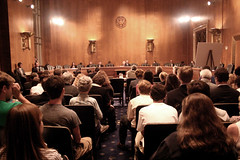Coal devastating region, U.S. Senate told
Several experts described the significant and permanent destruction the coal industry is creating in the Appalachian coalfields at a U.S. Senate committee hearing yesterday.
In the first-even Congressional hearing focused specifically on mountaintop removal, members of the Senate Public Work and Environment subcommittee on water and wildlife were told.
"The streams that are buried when rocks and dirt are dumped over the side of the mountain into the valleys below are gone forever, and there is no evidence to date that mitigation actions can compensate for the lost natural resources and ecological functions of the headwater streams that are buried."
Dr. Margaret Palmer, a University of Maryland ecologist who has studied mountaintop removal, went on to say that the impacts of burying headwater streams were felt for many miles down stream and are permanent. She said, for example, that elevated stream levels of selenium in some cases were found "50 years out."
Two of the senators on the committee seemed to have studied the issue enough to already know those facts.
 |
| Citizens for Coal discuss the mountaintop removal coal mining issue with Cody Simpkins of Kentuckians for the Commonwealth. Photo by Jamie Goodman |
"There is no denying coal's significance to the culture and economy of Appalachia," said Sen. Benjamin Cardin (D-MD), chair of the subcommittee. "However, mountaintop coal mining is a long-term assault on Appalachia's environment, economy, culture, and the health of its citizens."
Acknowledging that the Obama administration has taken some first steps toward protecting water quality, Sen. Lamar Alexander (R-TN) said: "The administration's decision will bring tighter scrutiny, but it is still important to pass the Cardin-Alexander legislation that would prohibit blowing off the tops of mountains and putting the waste in our streams. Coal is an essential part of our energy future, but it is not necessary to destroy our environment in order to have enough of it."
Tennessee Deputy Commissioner of Environment and Conservation Paul Sloan encouraged lawmakers to expand that prohibition to protect the region's vital headwaters streams. He said the practice of burying headwater streams is not allowed in Tennessee because of a state law.
Marie Gunnoe of the Ohio Valley Environmental Coalition testified as a coalfield citizen and urged Congress to "stop the annihilation of mountains and people by mountaintop removal" and seize the opportunity to create an new energy future for the coalfields.
Randy Pomponio, director of environmental assessment for a U.S. Environmental Protection Agency regional office, said mountaintop removal buries an average of 120 miles of streams a year, and studies show valley fills not only eliminate those waterways, but also degrade water quality downstream.
The only witness who defended mountaintop removal was Randy Huffman, secretary of the West Virginia Department of Environmental Protection.
Alexandar called yesterday's hearing the first of several. Dozens of coalfield residents were present for the hearing, including a KFTC delegation.
Recent News
Kentucky’s past legislative session showed alarming trend toward government secrecy
Churchill Downs takes more than it gives. That's why the Kentucky Derby is a no-go for me
‘We must never forget.’ Kentucky town installs markers for lynching victims.
Featured Posts
Protecting the Earth
TJC Rolling Out The Vote Tour – a KFTC Reflection Essay
KFTC Voter Empowerment Contractor Reflection Essay
Archives
- Home
- |
- Sitemap
- |
- Get Involved
- |
- Privacy Policy
- |
- Press
- |
- About
- |
- Bill Tracker
- |
- Contact
- |
- Links
- |
- RSS



Add new comment